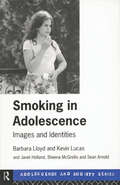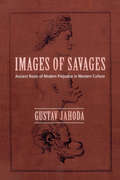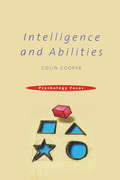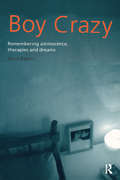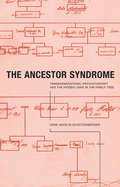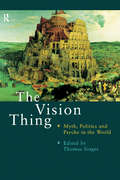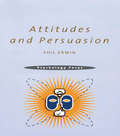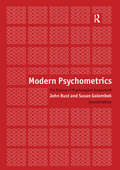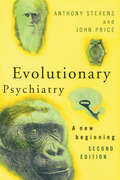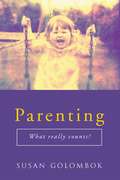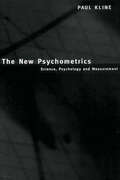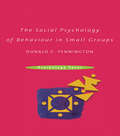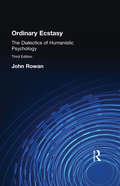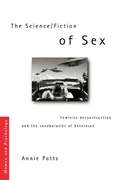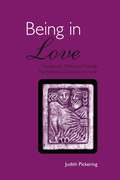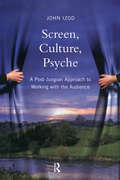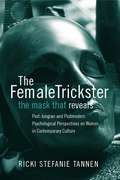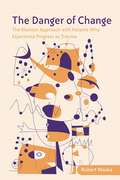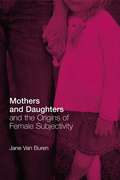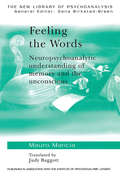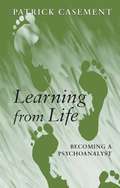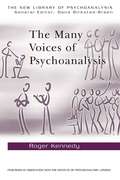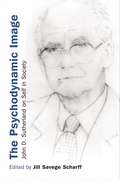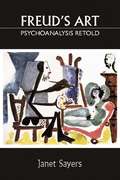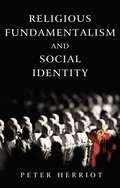- Table View
- List View
Smoking in Adolescence: Images and Identities (Adolescence and Society)
by Kevin Lucas Barbara LloydWhat factors influence adolescents to take up smoking? Why do more girls smoke than boys? In contrast to medical orthodoxy, Smoking in Adolescence looks at smoking from the adolescents' own points of view. What emerges is that regular smokers are seen as fun-loving and nonconformist; cigarettes are a passport to a fashionable, popular and 'hard' identity. Young people create, and are influenced by, complex images of smokers and nonsmokers. Barbara Lloyd and Kevin Lucas explore the psychological dimensions such as social environment, family, peers, stress and coping, body image, mood and pleasure. They suggest how anti-smoking interventions should be re-evaluated to take account of this new evidence throughout the school curriculum. Smoking in Adolescence will be of practical interest to teachers, youth workers, health professionals and parents as well as students of psychology.
Images of Savages: Ancient Roots of Modern Prejudice in Western Culture
by Gustav JahodaIn Images of Savages, the distinguished psychologist Gustav Jahoda advances the provocative thesis that racism and the perpetual alienation of a racialized 'other' are a central leagacy of the Western tradition. Finding the roots of these demonizations deep in the myth and traditions of classical antiquity, he examines how the monstrous humanoid creatures of ancient myth and the fabulous "wild men" of the medieval European woods shaped early modern explorers' interpretations of the New World they encountered. Drawing on a global scale the schematic of the Western imagination of its "others," Jahoda locates the persistent identification of the racialized other with cannibalism, sexual abandon and animal drives. Turning to Europe's scientific tradition, Jahoda traces this imagery through the work of 18th century scientists on the relationship between humans and apes, the new racist biology of the 19th century studies of "savagery" as an arrested evolutionary state, and the assignment, especially of blacks, to a status intermediate between humans and animals, or that of children in need of paternal protection from Western masters. Finding in these traditional tropes a central influence upon the most current psychological theory, Jahoda presents a startling historical continuity of racial figuration that persists right up to the present day. Far from suggesting a program for the eradication of racial stereotypes, this remarkable effort nevertheless isolates the most significant barriers to equality buried deep within the Western tradition, and proposes a potentially redemptive self-awareness that will contribute to the gradual dismantling of racial injustice and alienation. Gustav Jahoda demonstrates how deeply rooted Western perceptions going back more than a thousand years are still feeding racial prejudice today. This highly original socio-historical contextualisation will be invaluable to scholars of psychology, sociology and anthropology, and to all those interested in the sources of racial prejudice.
Intelligence and Abilities
by Colin CooperResearch into abilities is one of the great success stories of psychology. Ability tests are widely used and there is continued interest in the origins of abilites (enes or environment?) and their links to social phenomena such as crime and welfare dependecy. Intelligence and Abilities explains what is known about the processes associated with mental abilities and the relationship of abilities to behaviour. It also provides a clear and up-to-date guide to the main areas of research.
Boy Crazy: Remembering Adolescence, Therapies and Dreams
by Janet SayersIn answering these questions, Janet Sayers highlights the revolution wrought in both sexes' psychology by adolescence, particularly by its fantasies of divided selves and loves and of 'boy crazy' grandiosity and romance. Illustrated throughout with fascinating examples from a groundbreaking study of adolescent memories and dreams, Boy Crazy presents an engaging account of this little-researched period of human development. Sayers also draws on her own work as a therapist, and weaves in vignettes from fiction and film, to demonstrate the significance we attach in adulthood to our experiences as adolescents. She suggests that men and women respond differently to the sexual awakening that takes place during their teens, and to their own memories of that part of their life. In relating the findings of her research the author also explores to what extent the theories of Freud, Jung and feminism shape our understanding of the formative effect of adolescent experiences and emotions. Boy Crazy provides a fascinating insight into the repercussions of adolescence on our adult lives and loves and will appeal to the general and specialist reader alike.
The Ancestor Syndrome: Transgenerational Psychotherapy and the Hidden Links in the Family Tree
by Anne Ancelin SchutzenbergerIn The Ancestor Syndrome Anne Ancelin Schutzenberger explains and provides clinical examples of her unique psychogenealogical approach to psychotherapy. She shows how, as mere links in a chain of generations, we may have no choice in having the events and traumas experienced by our ancestors visited upon us in our own lifetime. The book includes fascinating case studies and examples of 'genosociograms' (family trees) to illustrate how her clients have conquered seemingly irrational fears, psychological and even physical difficulties by discovering and understanding the parallels between their own life and the lives of their forebears. The theory of 'invisible loyalty' owed to previous generations, which may make us unwittingly re-enact their life events, is discussed in the light of ongoing research into transgenerational therapy. Anne Ancelin Schutzenberger draws on over 20 years of experience as a therapist and analyst and is a well-respected authority, particularly in the field of Group Therapy and Psychodrama. First published as Aie, mes Aieux this fascinating insight into a unique style of clinical work has already sold over 32,000 copies in France and will appeal to anyone working in the psychotherapy profession.
The Vision Thing: Myth, Politics and Psyche in the World
by Thomas SingerContemporary politics goes on at a mythic level. This is the provocative argument put forward in this unique book which results from the collaboration of practising politicians, organisational and political consultants, scholars of mythology and culture, and Jungian analysts from several countries.The first part of the book focuses on leadership and vision, and features a reflection on myth and leadership by former U.S. Senator Bill Bradley. The second part deals with the way the theme of 'the one and the many' works itself out in politics today. From the perspective of 'the many', there are chapters on factionalism, ethnic strife, genocide and multiculturalism. From the perspective of 'the one', there are chapters on the economic myth and gender politics showing how these bring coherence to today's confused political scene, culminating in the suggestion that the modern political psyche is itself in the midst of a rite of passage.The relevance of the book to the practice and study of politics, mainstream and marginal, cannot be overemphasised and the book will provide stimulating reading for practitioners and students in these areas as well as for those engaged in psychological work such as therapy, counselling or analysis.
Attitudes and Persuasion
by Philip ErwinAttitudes and Persuasion provides an up-to-date overview of the crucial role that attitudes play in our everyday lives and how our thoughts and behaviour are influenced. The nature, function and origins of attitudes are examined, and a review of how they can be measured is given. The book addresses complex questions such as whether we always behave in accordance with our attitudes and what factors may influence us to change them.
Modern Psychometrics: The Science Of Psychological Assessment
by John Rust Susan GolombokThe edition of this classic text has been completely revised and updated, taking into account recent developments in the field of psychometrics. Part 1 of Modern Psychometrics outlines the background, history and controversies surrounding psychological testing. Part 2 provides a practical guide for developing a psychometric test. Modern Psychometrics forms the ideal companion for those studying for the British Psychological Society's Certificates of Competence in Testing
Evolutionary Psychiatry, second edition: A New Beginning (Routledge Mental Health Classic Editions Ser.)
by Anthony Stevens John PriceChallenging a medical model which has supplied few effective answers to long-standing conundrums, Evolutionary Psychiatry proposes a new conceptual framework for psychiatry based on Darwinian theory. Anthony Stevens and John Price argue that psychiatric symptoms are manifestations of ancient adaptive strategies which are no longer necessarily appropriate but which can best be understood and treated in an evolutionary and developmental context. They propose theories to account for the widespread existence of affective disorders, borderline states and schizophrenia, as well as offering solutions for puzzles such as sadomasochism and the function of dreams. This comprehensive introduction to the new science of Darwinian Psychiatry is readily accessible to both the specialist and non-specialist reader. It describes in detail the disorders and conditions commonly encountered in psychiatric practice and show how evolutionary theory can account for their biological origins and functional nature.
Parenting: What Really Counts?
by Susan GolombokParenting: What Really Counts? examines the scientific evidence on what really matters for children's healthy psychological development.The first section considers whether it is necessary to have two parents, a father present, parents who have a genetic link with their child, or parents who are heterosexual. Section two explores the psychological processes that underlie optimal development for children, particularly the quality of the child's relationship with parents, other family members and the wider social world. Contrary to common assumptions, Susan Golombok concludes that family structure makes little difference to children's day-to-day experiences of life.As well as for students, researchers and teachers, Parenting: What really counts? will be of great interest to parents and those thinking of embarking on a non-traditional route to parenthood. It will also be welcomed by professionals working with families and those involved in the development of family policy.
The New Psychometrics: Science, Psychology and Measurement
by Paul KlineMany psychological factors are little more than statistical descriptions of particular sets of data and have no real significance. Paul Kline uses his long and extensive knowledge of psychological measurement to argue that truly scientific forms of measurement could be developed to create a new psychometrics. This would transform the basis of psychology and change it from a social science to a pure science.
The Social Psychology of Behaviour in Small Groups (Psychology Focus Ser.)
by Donald C. PenningtonThe Social Psychology of Behaviour in Small Groups covers theories of group behaviour and their application in organizational psychology. Topics include the structure and formation of groups and the roles that individuals play within groups, as well as more applied areas such as co-operation and conflict, teamwork, leadership and decision-making in small groups.Throughout the book theory, research and concepts are applied to real-life and everyday social behaviour. The book is well illustrated and includes many mental exercises to engage the reader. Donald Pennington has provided a lively, accessible and systematic text suitable for undergraduates studying social psychology and those studying organizational psychology on psychology and business studies courses.
Ordinary Ecstasy: The Dialectics of Humanistic Psychology
by John RowanHumanistic Psychology ranges far and wide into education, management, gender issues and many other fields. Ordinary Ecstasy, first published in 1976, is widely regarded as one of the most important books on the subject. Although this new edition still contains much of the original material, it has been completely rethought in the light of postmodern ideas, with more emphasis on the paradoxes within humanistic psychology, and takes into account changes in many different areas, with a greatly extended bibliography.Ordinary Ecstasy is written not only for students and professionals involved in humanistic psychology - anyone who works with people in any way will find it valuable and interesting.
The Science/Fiction of Sex: Feminist Deconstruction and the Vocabularies of Heterosex (Women and Psychology)
by Annie PottsWhat can we learn from exploring the differences in male and female orgasmic experience? Is the penis an entity with a mind of its own? These issues and others, such as the popular portrayals of male sexuality as active and outwardly focused and female sexuality as passive and internally located, are discussed in The Science/Fiction of Sex. Contemporary feminist and poststructuralist theories of sex and gender are explored alongside an investigation of how people make sense of such concepts as heterosexuality, orgasm, sexual dysfunction, femininity and masculinity, and safer sex practice.Potts asks men and women about their actual experiences of heterosex. This interview material, combined with excerpts from sexological and medical texts and features from film and television, draws attention to the ways in which western cultural constructs influence our ideas and experiences of the body, sex, and gender. Potts also uses deconstructive theory as a textual tool, concentrating on how binary oppositions such as inside/outside and mind/body impact on our understandings of heterosex, and affect the power relations between women and men. She also examines how the radical postmodern theories of the body and sexuality proposed by Irigaray, Lyotard, and Deleuze and Guattari disrupt such dualistic modes of understanding and experiencing sexualized bodies. The Science/Fiction of Sex will be of interest to those studying women and psychology as well as gender studies, cultural studies, feminist studies, sociology, philosophy, public health and education.
Being in Love: Therapeutic Pathways Through Psychological Obstacles to Love
by Judith PickeringFinding true love is a journey of transformation obstructed by numerous psychological obstacles. Being in Love expands the traditional field of psychoanalytic couple therapy, and explores therapeutic methods of working through the obstacles leading to true love. Becoming who we are is an inherently relational journey: we uncover our truest nature and become most authentically real through the difficult and fearful, yet transformative intersubjective crucibles of our intimate relationships. In this book, Judith Pickering draws comparisons between Bion's concept of becoming in O, and being in love. She searches for pathways that lead away from relational confusion towards the discovery of genuine transformational relationships, and works towards finding better ways of relating to one another. This is achieved by encouraging couples to enjoy the actual presence, humanity, otherness and particularity of each other rather than expecting a partner to conform to our own expectations, projections, desires and presuppositions. Pickering draws on clinical material, contemporary psychoanalysis, cultural themes from the worlds of mythology and literature, and a wealth of therapeutic techniques in this fresh approach to couple therapy. Being in Love will therefore interest students and practitioners of psychoanalysis, psychology, and couple therapy, as well as all of those seeking to be more authentic in their relationships.
Screen, Culture, Psyche: A Post Jungian Approach to Working with the Audience
by John IzodScreen, Culture, Psyche illuminates recent developments in Jungian modes of media analysis, and illustrates how psychoanalytic theories have been adapted to allow for the interpretation of films and television programmes, employing Post-Jungian methods in the deep reading of a whole range of films. Readings of this kind can demonstrate the way that some films bear the psychological projections not only of their makers but of their audience, and assess the manner in which films engage the writer’s own psyche. Seeking to go beyond existing theories, John Izod explores the question of whether Jungian screen analysis can work for ordinary filmgoers - can what functions for the scholar be said to be true for people without a background in Jung’s ideas? Through detailed readings of a number of films and programmes, John Izod builds on the work previously done by Jungian film analysts, and moves on to contemplate the level of audience engagement. Offering deep readings of films directed by Kubrick and Bernardo Bertolucci, as well as satirical comedy, documentaries and twenty-first century Westerns, the book explores the extent to which they manage to make the psychological impact on spectators that films of a similar kind have done on Jungian writers. The author concludes that the screen texts with the best likelihood of impacting the culture of the audience through their collective psychological force fall at opposite ends of the size and budget range: highly personal documentaries, and the most affecting of mainstream genre movies. This innovative text will be essential reading for psychoanalysts and therapists, as well as students and scholars of film with an interest in understanding how screen products work psychologically to engage the viewer.
The Female Trickster: The Mask That Reveals, Post-Jungian and Postmodern Psychological Perspectives on Women in Contemporary Culture
by Ricki Stefanie TannenThe Female Trickster presents a Post-Jungian postmodern perspective regarding the role of women in contemporary Western society by investigating the re-emergence of female trickster energy in all aspects of popular culture. Ricki Tannen explores the psychological aspects of what happened when women’s imagination was legally and psychologically enclosed millennia ago and demonstrates how the re-emergence of Trickster energy through the female imagination has the radical potential to effect a transformation of western consciousness. Examples are drawn from a diverse range of sources, from Jane Austen, and female sleuth narratives, to Madonna and Sex and the City, illustrating how Trickster energy is used not to maintain power and control but to integrate and unite the paradoxical through humour. Subjects covered include: imagination and metaphor the traditional trickster law and the imagination humour: Eros using logos the postmodern female trickster. This highly original perspective on women's role in contemporary culture will offer readers a new vision of how humour psychologically operates as a healthy adaptation to trauma and adversity. It will be of great interest to all analytical psychologists and psychoanalysts as well as those in women's, cultural, legal and literary studies.
The Danger of Change: The Kleinian Approach with Patients Who Experience Progress as Trauma
by Robert WaskaConfusing clinical standoffs, loyalty to self-destruction and abrupt terminations are challenging and under-examined problems for the modern psychoanalytic practitioner. The Danger of Change is a timely book that addresses the so-called resistant patient so many clinicians are familiar with. Robert Waska blends theory based on Melanie Klein’s classical stance with the more contemporary Freudian/Kleinian school, to demonstrate how to understand patients that are resistant to progress. Divided into four sections, this book covers: reluctant patients and the fight against change: caught between the paranoid and depressive world greed and the dangers of change interruptions to the process of change: loss, envy, and the death instinct working toward change in the face of overwhelming odds Extensive and detailed clinical material is used to bring clarity to subjects including symbolism, conflict resolution, projective identification, the depressive and paranoid positions, change and trust. The Danger of Change brings hope and clarity to cases involving patients who experience progress as a threat to their emotional wellbeing. It will be of great interest to all practising psychoanalysts, as well as those studying psychoanalytic theory and practice.
Mothers and Daughters and the Origins of Female Subjectivity
by Jane Van BurenMothers and Daughters and the Origins of Female Subjectivity challenges the theory of the Oedipus complex, which permeates psychoanalytic theory, psychology, semiotics and cultural studies. The book focuses on the re-examination of women’s development through the theories of primitive mental states. Women’s subjectivity has been profoundly limited by continuing anxieties about the mother’s body. Jane Van Buren describes how women are gradually escaping the curse of inferiority and finding a voice, enabling the mother to provide their daughters with a legacy of rightful agency over their bodies and minds. Drawing on the theories of Klein, Bion and Winnicott, and incorporating recent developments in psychobiology, this book provides a novel approach to subjects including the dreams, myths and phantasies of individuals, the nature of mother and daughter relationships, sexuality, pregnancy, menstruation and the idea of the mother’s body as problematic and dangerous. This interdisciplinary investigation into curtailed female subjectivity and its many ramifications in society, culture and individual mental growth will be of great interest to all practising psychoanalysts, and those studying psychoanalytic theory and gender studies.
Feeling the Words: Neuropsychoanalytic Understanding of Memory and the Unconscious (The New Library of Psychoanalysis)
by Mauro ManciaHow are the implicit memory and the unrepressed unconscious related? Feeling the Words incorporates a thorough review of essential psychoanalytic concepts, a clear critical history of analytical ideas and an assessment of the contribution neuroscience has to offer. Mauro Mancia uses numerous detailed clinical examples to demonstrate how insights from neuroscience and infant development research can change how the analyst responds to his or her patient. Major topics such as the transference, the Oedipus complex, the interpretation of dreams and the nature of mental pain are reviewed and refined in the light of these recent developments. The book is divided into three parts, covering: Memory and the unconscious The dream: between neuroscience and psychoanalysis Further reflections on narcissism and other clinical topics Feeling the Words offers an original perspective on the connection between memory and the unconscious. It will be welcomed by all psychoanalysts interested in investigating new ways of working with patients.
Learning from Life: Becoming a Psychoanalyst
by Patrick CasementAll of life can be a resource for our learning. In his fourth and most personal book, Patrick Casement attempts to understand what he has learned from life, sharing a wide range of those experiences that have helped shape the analyst he has become. Patrick Casement shares various incidents in his life to demonstrate how these helped lay a foundation for his subsequent understanding of psychoanalysis. These examples from his life and work are powerful and at times very moving, but always filled with hope and compassion. This unique book gives a fascinating insight into fundamental questions concerning the acquisition of analytic wisdom and how personal experiences shape the analyst's approach to clinical work. It will be of great interest to all psychoanalysts and psychoanalytic psychotherapists.
The Many Voices of Psychoanalysis (The New Library of Psychoanalysis)
by Roger KennedyThe Many Voices of Psychoanalysis spans over thirty years of Roger Kennedy's work as a practicing psychoanalyst, providing a fascinating insight into the process of development of psychoanalytic identity. The introduction puts the papers into context, charting the development of the author’s practice and understanding of psychoanalysis and his position as part of the British Independent tradition. The intention of the chapters is to address the 'many voices' of psychoanalysis - the many roles and approaches a psychoanalyst may take, while adhering to the established ideas of psychoanalysis. The author takes into account the various influences which shape the psychoanalytic voice, drawing on literature, philosophy and sociology as well as analytic ideas. Subjects covered include: aspects of consciousness - one voice or many? handling the dual aspect of the transference bearing the unbearable - working with the abused mind the internal drama - psychoanalysis and the theatre a psychoanalyst in the family court. This book will be of use not only to practicing psychoanalysts, but also to psychoanalytic psychotherapists and other mental health workers. It will also appeal to anyone interested in the relationship between psychoanalysis and related disciplines.
The Psychodynamic Image: John D. Sutherland on Self in Society
by Jill Savege ScharffThe Psychodynamic Image is the first selection of John D. Sutherland’s major papers. It provides an overview of the development of his thought on self and society and reveals the extent of his contribution to the field of mental health. Jill Savege Scharff introduces Sutherland’s most important and influential essays. These reflect his range as a theoretician, moving easily from the intrapsychic to the interpersonal level, building bridges between points of view and integrating psychoanalytic and social theories. Sutherland’s work calls for changes at the individual level through understanding conflicts and unconscious processes as aspects of parts of the self in interaction. He inspires respect and understanding of the self and its drive toward autonomy. These papers push the boundaries of psychoanalytic thinking and succeed in demonstrating the relevance of psychoanalysis to the wider society. They will be of great interest to psychoanalysts, psychotherapists, counsellors and social workers.
Freud's Art - Psychoanalysis Retold
by Janet SayersIn Freud's Art – Psychoanalysis Retold Janet Sayers provides a refreshing new introduction to psychoanalysis by retelling its story through art. She does this by bringing together experts from psychoanalysis, art history, and art education to show how art and psychoanalysis illuminate each other. Freud's Art begins with major founders of psychoanalysis - Freud, Jung, Spielrein and Klein. It then details art-minded developments of their ideas by Adrian Stokes, Jacques Lacan, Marion Milner, Anton Ehrenzweig, Donald Winnicott, and Wilfred Bion before concluding with the recent theories of Jean Laplanche and Julia Kristeva. The result is a book which highlights the importance of psychoanalysis, together with painting and the visual arts, to understanding the centrality of visual imagery, fantasy, nightmares and dreams to all of us, artists and non-artists alike. Illustrated throughout with fascinating case histories, examples of well known and amateur art, doodles, drawings, and paintings by both analysts and their patients, Freud's Art provides a compelling account of psychoanalysis for all those studying, working in, or simply intrigued by psychology, mental health and creativity today.
Religious Fundamentalism and Social Identity
by Peter HerriotThe attacks on the World Trade Centre and the Pentagon in the United States of September 11th, 2001 brought the phenomenon of religious fundamentalism to the world's attention.Sociological research has clearly demonstrated that fundamentalists are primarily reacting against modernity, and believe that they are fighting for the very survival of their faith against the secular enemy. But we understand very little about how and why people join fundamentalist movements and embrace a set of beliefs, values and norms of behaviour which are counter-cultural. This is essentially a question for social psychology, since it involves both social relations and individual selves. Drawing on a broad theoretical perspective, social identity theory, Peter Herriot addresses two key questions: why do fundamentalists identify themselves as an in-group fighting against various out-groups? And how do the psychological needs for self-esteem and meaning motivate them? Case studies of Mohammed Atta, the leader of the 9/11 hijackers, and of the current controversy in the Anglican Church about gay priests and bishops, demonstrate how fruitfully this theory can be applied to fundamentalist conflicts. It also offers psychologically sensible ways of managing such conflicts, rather than treating fundamentalists as an enemy to be defeated. Religious Fundamentalism and Social Identity is unique in applying social identity theory to fundamentalism, and rare in that it provides psychological (in addition to sociological) analyses of the phenomenon. It is a valuable resource for courses in social psychology which seek to demonstrate the applicability of social psychological theory to the real world.
